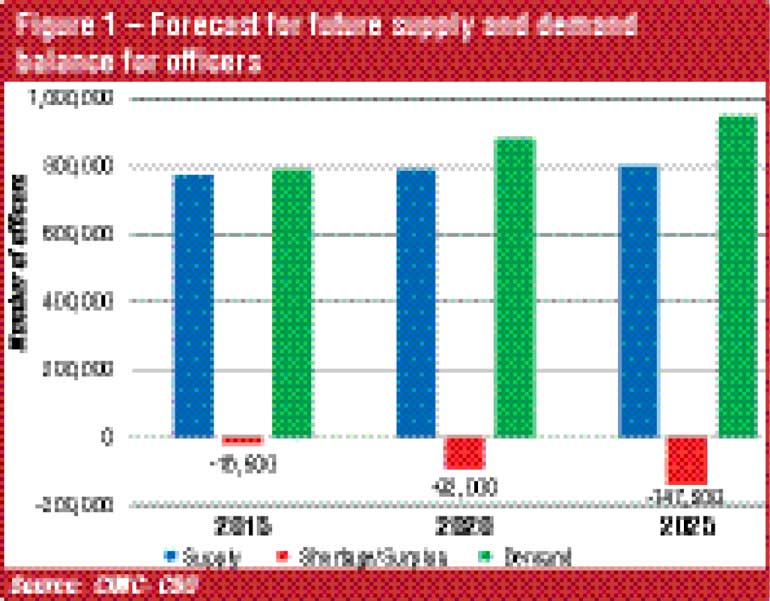Wednesday Feb 18, 2026
Wednesday Feb 18, 2026
Monday, 23 October 2017 00:00 - - {{hitsCtrl.values.hits}}
The Government of Sri Lanka deposited the instrument of ratification of the Maritime Labour Convention 2006 (MLC 2006) with the International Labour Office (ILO) in January 2017, becoming the 81st ILO member state and the 16th Asian state to have ratified the Convention. The MLC 2006 will enter into force for Sri Lanka on 12 January 2018. Sri Lanka’s Permanent Representative to the United Nations, Ambassador Ravinatha Aryasinha, who deposited the instrument of ratification, said Sri Lanka looked forward to working closely with the ILO for capacity building and training in labour standards and labour inspection.
This ratification is all the more timely as it will allow Sri Lanka to improve labour conditions for its more than 22,000 seafarers and ensure that ships calling at its ports are inspected in compliance with the requirements of the Convention, thereby promoting quality shipping and providing additional protection for seafarers transiting within its waters.

Contribution of seafarers to the economy
In 2015 seafarers have contributed over $200 million per annum to the economy. Seafarers attract a higher income than any other Sri Lankan expatriate staff in the same level. For example when a domestic aid brings in a monthly income of close to $300, a seafarer at entry level would attract a monthly income close to $1,000. At the rank of Officer and Captain the salary scale is significantly higher. Therefore, by promoting Sri Lanka as a hub for seafarer recruitment the economy can expect a higher contribution. Foreign exchange earnings, employment opportunities and increased domestic spending would have a profound impact to the Sri Lankan Economy. CASA has played a leading role, through its members, by engaging in training and development of seafarers, making them employable, and finding them employment opportunities.
Global outlook
The demand for seafarers will keep growing over the next 10 years with the growth of global trade. Expansion of the Panama Canal has also resulted in a demand for larger vessels which results in an increase in the demand for seafarers. China, Philippines, Indonesia, Russia and Ukraine are among the top 5 countries who train and supply seafarers (source: Manpower Report 2015 – BIMCO).
However, there is a shortage of marine officers in the world and the shortage is expected to increase over time. The forecasted shortage of officers will grow from 16,500 in 2015 to 147,500 by 2025 (refer figure 1).
The role of a seafarer has also changed over time. The adjustment in working practices from the ‘command and control’ system at sea to the more collaborative management style and the technological disruptions in the maritime sector would require the seafarer to be equipped with a different skill-set. For example, with the introduction of autonomous ships, ship navigation can happen ashore and will change the dynamics of the profession.
Seafarer trainingin Sri Lanka – opportunities and challenges
Sri Lankan employees are hailed globally for their work ethic and overall conduct, and therefore, Sri Lanka is preferred for talent sourcing. This is mainly due to the sound education system in the country, which promotes equal opportunity for education, and our unique culture, which has moulded work ethics such as team work, reliability, dedication, honesty and integrity. This quality workforce is the greatest asset that should be capitalised by Sri Lanka.
CASA member-institutes engage in training and development of seafarers while complying with the standards of the International Maritime Organization (IMO), and therefore, is recognised internationally. These institutes are equipped with state of the art technologies such as marine simulators and the qualifications are regulated by the Merchant Shipping Secretariat of Sri Lanka.
The Government on the other hand is aggressively working on a shipping policy which will bring in consistent procedures for seafarer training. The government plays an active role in facilitation and enhancement of employment opportunities in foreign ships for Sri Lankan seafarers and ensures their safety. With the ratification of the Maritime Labour Convention, the government will have to be committed to improving labour conditions for Sri Lankan seafarers.
As we are competing globally to promote the Sri Lankan seafarer, it is noteworthy to look at some success stories. The Philippines government has passed new regulations to protect seafarers (Anti-Ambulance Chasing Act) and has gone to the extent of providing scholarships, housing and provident benefits to them. They have also established a one-stop centre to expedite the processing of employment documents. These initiatives have helped the Philippines to retain its position among the top 5 countries who train and supply seafarers to the world.
It is important that consistency in policy is maintained by the government, as regular changes to syllabi, assessments, taxation, etc. will adversely affect seafarer training. Duration of seafarer training is relatively longer, and therefore, abrupt policy changes will not help the industry.
Regular consultation with all stakeholders including ship owners, institutes and unions will help Sri Lanka create a competitive edge in seafarer training and development. Building awareness among Sri Lankans about this lucrative occupation at school level would also attract a wider audience and enhance the economic contribution to the country. (Source: Ceylon Association of Shipping Agents)